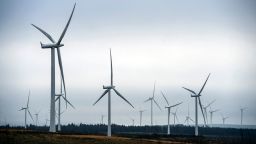German Chancellor Olaf Scholz was accused Monday of comparing climate activists to Nazis, in allegations that his spokesperson said were “completely absurd.”
Scholz was speaking at a Catholic Day panel event in the city of Stuttgart on Friday when protesters disrupted him, with one activist reportedly trying to get up on stage before being blocked by security staff.
“I’ll be honest: These black-clad displays at various events by the same people over and over again remind me of a time that is, thank God, long gone by,” he said in an exchange captured on camera.
His remarks went viral on Monday on social media, where a number of users expressed anger over his comments.
Scholz was speaking about the phase-out of coal-fired power generation and resulting jobs losses in open cast mining when he was interrupted.
Many Germans have taken the leader’s words as a reference to the Nazis’ SS black-uniformed corps.
“I have also been to events where five people sat dressed in the same way, each had a well-rehearsed stance, and then they do it again every time,” he said. “And that’s why I think that is not a discussion, that is not participation in a discussion, but an attempt to manipulate events for one’s own purposes. One should not do this.”
Scholz’s comments sparked furor, with climate activist Luisa Neubauer commenting that the chancellor “compares climate activists to Nazis.”
“Where does one begin? In just one half-sentence, the Chancellor of the Federal Republic relativizes the Nazi regime and, in a paradoxical way, also the climate crisis,” she wrote on Twitter. “He stylizes climate protection as an ideology with parallels to the Nazi regime. In 2022. Jesus. This is such a scandal.”
CNN has reached out to the German government for comment.
A government spokesperson earlier denied Scholz was making the comparison, calling the accusation “completely absurd.”
“These statements by the Chancellor speak for themselves and I would not want to comment on them here. But I can say that such a comparison is, of course, completely absurd,” federal government spokeswoman Christiane Hoffmann said.
“The Chancellor has made climate protection a priority of this legislative period of his chancellorship and he is, of course, always ready to deal with this topic and to discuss it,” she added.
A journalist at the conference further pressed Hoffman on Scholz’s comments, noting: “‘Dark times’ in Germany usually refers to the Nazi-era. You’re saying that is not what Scholz meant?”
Hoffmann replied: “I didn’t say what was meant or not meant, I just said that I’m not commenting on it and that the statements stand for themselves.”
Prominent German Climate scientist Friederike Otto commented that “Scholz ‘forgets’ our worst history, dismisses every generation that comes after him as irrelevant & the audience just applauds.”
Scholz’s appointment as German chancellor came just months after Germany suffered its worst climate disaster of recent years, after devastating summer floods killed nearly 200 people there and dozens more across the border in Belgium.
The chancellor leads a three-party coalition with partners the Greens and pro-business Free Democrats, and their pledge to improve climate change action was central to their campaign.
The new government plans to phase-out of coal by 2030 – eight years earlier than Merkel’s party’s previous 2038 target, and in March, the government brought forward its deadline for a full transition to renewables in its power sector by at least five years, to 2035.

